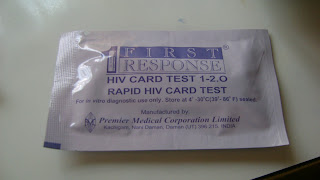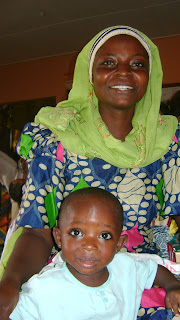I have had the opportunity to experience many parts of Ghanaian life from the food to local traditions and norms. So I talked earlier about the idea of “this is Africa” and yes I had many of these moments. One I will never forget is having a live chicken between my feet for a 5 hour tro tro ride (and I am not a fan of birds). Another time I was on the phone with my mom in a tro tro and she said is that a kid in the background and my response was not there is a goat under the seats in the back. Another would be trying to get money out from an ATM. There are many ATM’s around, but the chances of them working is quite low. We all had the mantra if the ATM is working get money, who knows when it will be working again.
 |
| Yes that is a live chicken between my legs, that at one point was flapping around and pecking me. |
You can buy almost anything from the side of the road from either a women or child selling it from the top of their head or from a small stand. I will miss the convenience of this. I think what I will miss most is the fresh fruit everywhere (especially pineapple), tiger nuts, plantain chip and fan ice. I loved pineapple so much I got it just about every day, I had my own pineapple lady in Swedru that was always so nice. I am going to miss the fresh pineapple of Asia and Africa so much. I already know I am not going to enjoy imported pineapple at home. I also loved plantain chips, and I will be teaching myself to make these when I get home.
Experiencing markets in Ghana gives you a feel for African culture. The experience was never dull but I loved it. At times the people selling were a little pushy and got mad when you did not buy from them. When this happened had to remember that selling impacts their ability to care for their family. I bought anything from food to cloth in the market. You can find almost anything being sold.
 |
| Market in Kumasi. The market when on forever. All of the metal roofs are part of the market. |
 |
| Market in Swedru |
One distinct experience I had every day was drinking out of a plastic bag. Every bit of water I drank while I was their came from a plastic bag. Sometimes it was a little plastic taste due to being heated when transported on an open truck in the sun, but for the most part is was fine. Bottled water is much less readily available and is more expensive. Pop also was put in rubbers (plastic bags) as the glass bottles are returned and reused. I cannot count the number of times I ripped a corner of a plastic bag to have a drink. It takes some technique since I spilled my fair share of water when I first started and forbid you forget it is open and squeeze it.
 |
| Water by the bag! |
 |
| Bottoms up! |
My experience with food was both a positive and negative one. I loved eating the foods that were distinctly Ghanaian, but by the time I left if I ate one more bit of rice or spaghetti I was going to lose my mind. Protein and veggies were often hard to come by. Fufu is a Ghanaian dish that I saw made often. It is a mix of cooked plantain and cassava that is pounded together. It is amazing the technique they goes into this dish. It is so much work and seeing it made for 35 kids is an experience. The dough is then eaten in a soup and with some type of meat. My favorite was groundnut soup with chicken. However I did have lite soup with goat also. Each soup is very distinct and makes the experience of fufu very different. Some of the other traditional dishes I had on a regular basis were jolof, red red, and fried plantain.
 |
| Adjingo was a Fufu pro |
Fufu being pounded
 |
| Aiphia enjoying the making of fufu |
 |
| I tired but I was not very good. was always worried I would hit the person's hand. |
 |
| Fufu with Lite Soup and Goat |
 |
| Red Red with rice, but it can be eaten with fried plantain also. |
So I have been on a quest to try local drinks while I am in each country. I will never forget the intense taste of both of the local liquors I tied while I was her. Both Alomo and Abateshi (brewed from palm wine) are on the list of things I have tied but I will never try again. Both were like drinking what I think fuel would taste like. I did really like both Star beer and Alvaro which is a non-alcoholic malt drink. Alvaro is something I will miss when I get home.
From my experience here I have decided that almost anything can be carried on your head. I carried a few things on my head with limited success. They kids always laughed at me when I tried, even if I felt I was doing a good job. Their necks much be so strong!!! It was also amazed by a women’s ability to carry a child on her back. I tried this also and found the child is much more secure than one may think from one piece of folded cloth.
 |
| Woman at work |
 |
| I love this photo!!! |
 |
| Fast asleep on mom's back. |
One thing I will not miss from Ghana is being called Obruni (this is foreigner in Tui).This is yelled at you anytime you are walking down the street in a town or city. If you don’t get this yell you may get looks. I especially got this when I was walking through Accra with my large backpack on my back and my small one on my front. I learned to ignore it but it was still so different than being at home where no one pays attention to anyone. I also had many experiences of being grabbed constantly by random men. They don’t want to hurt you, they just want you to talk to them. I can’t count the number of times I was asked “will you be my friend” or “will you marry me”. I told many people I was married. Most times my husband’s name was Kevin. I am really not going to miss being a spectacle and look forward to just walking down the street and know one paying attention to me. I now know that I never want to be famous, I like being able to walk down and street without being hassled.
One more distinct experience was learning abou the use of Fante names. Fante is a group of people that live in the southern coast of Ghana where the orphanage is located. Most children who are part of the Fante group have both an English and (sometimes called a school name) Fante name. Fante names are given by the day of the week you were born on. At first I was inquisitive about the fact that so many people would have the same name. As result of these questions I learned that many times there is variation on the names. For example Ama which is may be called Rama. It was also interesting to learn that children are named for birth order also. In the orphanage there were twins who were 6 one male and one female. The first born male’s name is Panyin and the second born female is Kaakra . There English names we Francis and Franscisca. When I got there I was super confused but gained understanding as I asked more questions. Some of the kids are the orphanage went by their Fante names while other went by their English name. By the time I left I could use both names interchangeably for most children. My name was Yaa as I was Thursday born.
Day | Boy | Girl |
Sunday | Kwesi | Esi |
Monday | Kojo | Adjoa |
Tuesday | Abena | Kwadina |
Wednesday | Akua | Kweku |
Thursday | Yaa | Yaaw |
Friday | Efua | Kofi |
Saturday | Ama | Kwami |




































